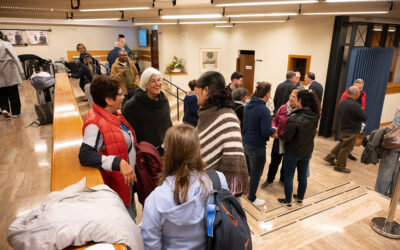Nostalgia is a very specific feeling and, in many people, it often gives riseto moral, philosophical and spiritual questions. Etymologically it means “pain of return,” and sometimes has an indeterminate sense: sometimes it is not linked to a past made up of real places, people or events but to a deep emotion that makes us yearn for something beautiful, just and universal. It is as if we know we are part of it or called to this “something”.
The theme of exile runs through the history of human thought: the voyage of Odysseus (sung in Homer’s Odyssey) is a journey that recalls the infinite because although it is unfinished and open-ended, it also conveys a sense of wisdom.
(…)
“Keep Ithaca always in your mind. Arriving there is what you are destined for. But do not hurry the journey at all. Better if it lasts for years. (…) And if you find her poor, Ithaka won’t have fooled you. Wise as you will have become, so full of experience, you will have understood by then what these Ithakas mean.”[1]
Every story of exile, whether it is taken from ancient civilizations or the present day, addresses existential questions that are fundamental to all ages: does this story have meaning? Is there a “thread” behind it all? This question can also be addressed on a personal level: is there meaning to what I am experiencing or have experienced? Why the evil, the pain, the death? These are questions that are often not asked but, according to recent studies, they are deeply felt by young people and express their real needs. Nostalgia for the infinite is often manifested in melancholy, loneliness and a search for reasons and answers. [2]
Yet these questions struggle to emerge: we are distracted by what is happening around and by the worries that torment us. Perhaps we do not pause long enough to recognise the little answers that surround us that can be a light to help us maintain a sense of purpose in life.
So let us try to look for opportunities where we can find time and space for sharing, listening and reflecting with those who travel through life with us. Let’s do so with our community, our friends and work colleagues. Let’s tackle these questions without losing faith that things can change for the better. We too will feel changed as a result.
In Christian communities all over the world, Easter is celebrated this month. The message that lies behind the “three days” that are central to this season is strong: it poses questions for all people who are ready to reflect and are open to dialogue[3]. The mystery of pain, the ability to “enter” into the wounds of humanity and the strength to begin again are the values shared by every person who accompanies us as we journey forward through difficult times.iii They are a personal guide for us at all times.
© Photo da StockSnap/Pixabay
——————————–
THE IDEA OF THE MONTH is currently produced by the Focolare Movement’s “Centre for Dialogue with People of Non religious Beliefs”. It is an initiative that began in 2014 in Uruguay to share with non-believing friends the values of the Word of Life, i.e. the phrase from Scripture that members of the Movement strive to put into practice in their daily lives. Currently, THE IDEA OF THE MONTH is translated into 12 languages and distributed in more than 25 countries, with adaptations of the text according to different cultural sensitivities.
[1]Konstandinos P. Kavafis. Poesie, Mondadori, Milano 1961
[2]Istituto Giuseppe Toniolo: Cerco, dunque credo? (Vita e Pensiero, 2024) cura di R. Bichi e P. Bignardi
[3]Convegno Internazionale “Il senso nel dolore?” (Castel Gandolfo, 2017) https://www.cittanuova.it/senso-neldolore/?ms=006&se=007




0 Comments